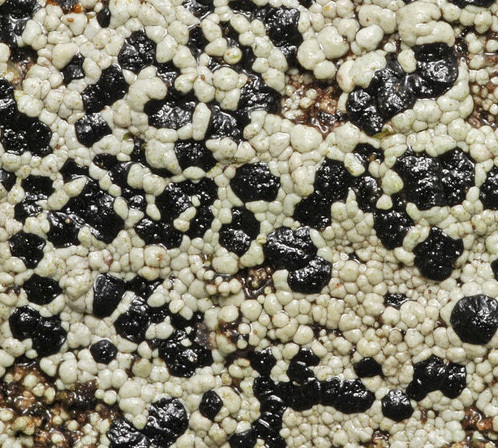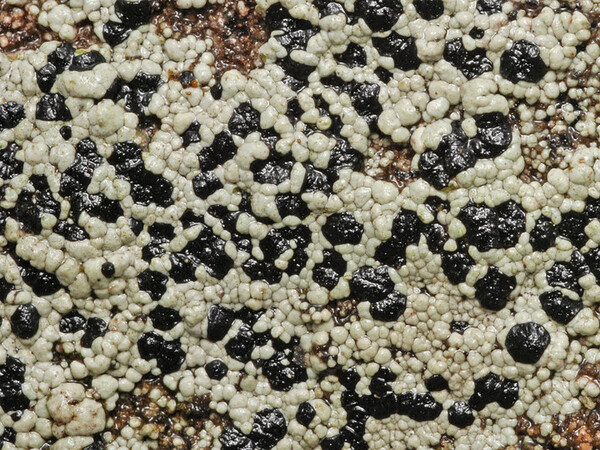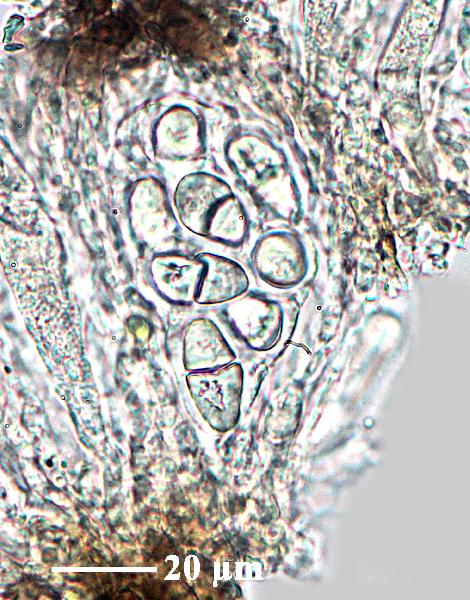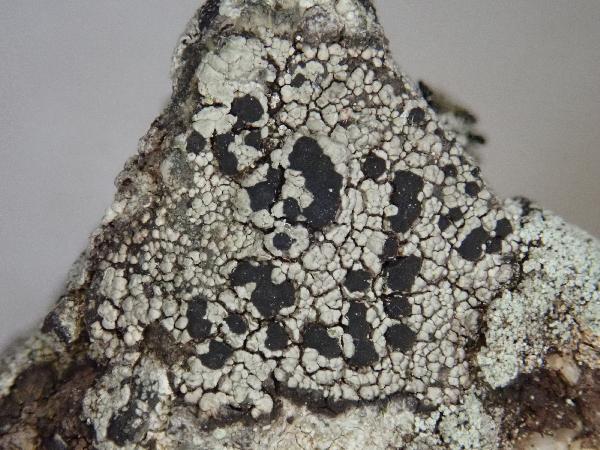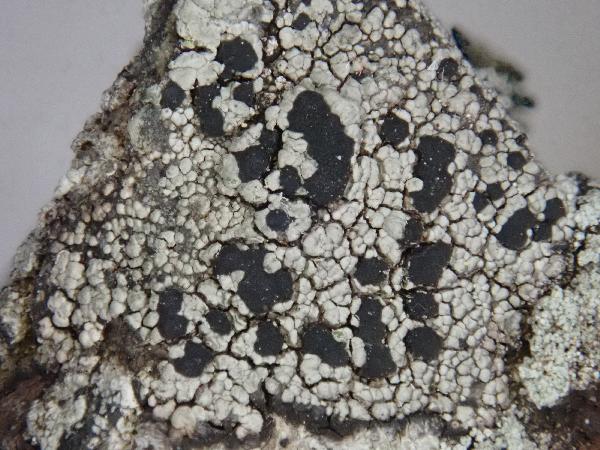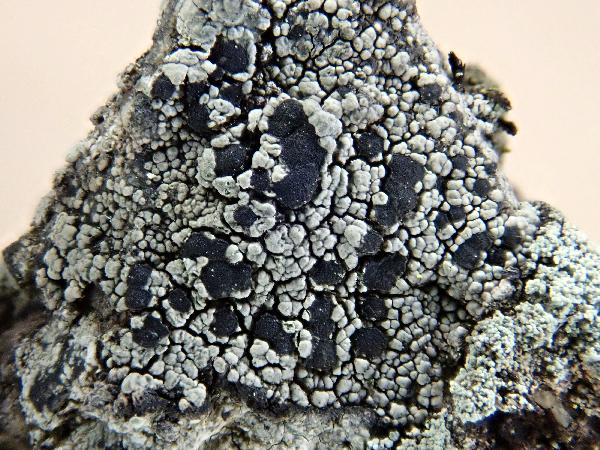Rehmia cinereovirens (Müll. Arg.) E.J. Möller, Timdal, Haugan & Bendiksby
Fungal Syst. Evol, 16: 224, 2025. Basionym: Patellaria cinereovirens Müll. Arg. - Flora, 51: 49, 1868
Synonyms: Rhizocarpon cinereovirens (Müll. Arg.) Vain.; Rhizocarpon eupetraeoides (Nyl.) Blomb. & Forssell non auct.
Distribution:
Description: Thallus crustose, episubstratic, areolate, white, cream-coloured to pale grey, rarely delimited by a thin, grey, fimbriate prothallus, the areoles 0.3-0.4 mm wide, flat to almost bullate. Medulla white, I-. Apothecia lecideine, black, (0.3-)0.4-0.6 mm across, with a flat to slightly convex disc and a usually persistent, but hardly raised, rarely finely excluded proper margin. Proper exciple poorly developed, of radiating hyphae, dark brown in outer part, pale within; epithecium olive-green to blue-black, K+ blue-green, N+ red; hymenium colourless, 70-90 µm high; paraphysoids richly branched and anastomosing, coherent in water, less so in K, c. 2.5 µm thick, the apical cells abruptly swollen, up to 3 µm wide, with a dark cap; hypothecium brown. Asci 8-spored, clavate, fissitunicate, with a well-developed tholus that is K/I- in lower part and K/I+ blue near the apex, lacking an ocular chamber, Rhizocarpon-type. Ascospores 1-septate, long remaining hyaline, ellipsoid, 11-18 x 5.5-8.5 µm, halonate. Photobiont chlorococcoid. Spot tests: medulla K+ yellow then red (needle-like crystals) or K+ yellow, C-, KC-, P+ yellow or P+ orange.red. Chemistry: thallus with norstictic and/or stictic acids.Note: a silicicolous species growing on exposed surfaces of acid rocks located near the ground in cold-humid situations, most frequent in Northern and Central Europe, also reported from Switzerland. To be looked for in the Italian Alps.
Growth form: Crustose
Substrata: rocks
Photobiont: green algae other than Trentepohlia
Reproductive strategy: mainly sexual
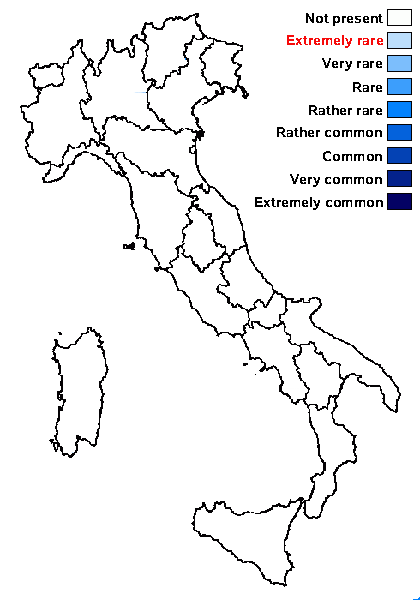
Predictive model
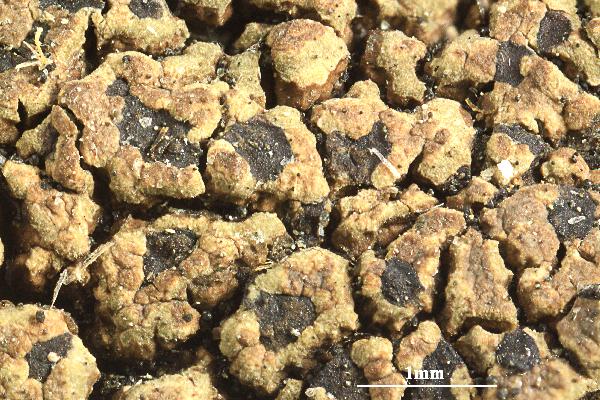

Felix Schumm - CC BY-SA 4.0
[10543], Österreich, Steiermark, Niedere Tauern, Donnersbacher Alpen,
Morsbachhütte, Glimmerschieferblock, ca. 1300 m. Leg. et det.
Erich Putzler, 11.08.1954.
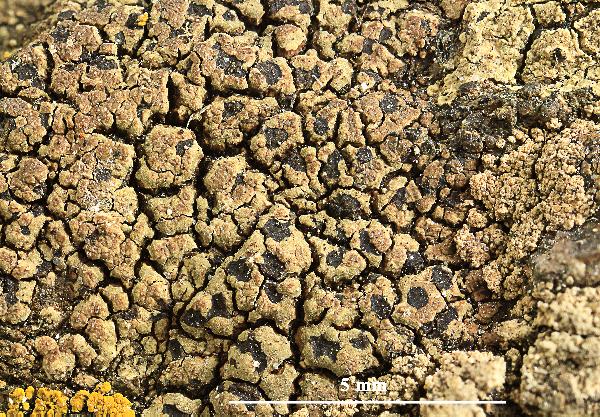

Felix Schumm - CC BY-SA 4.0
[10543], Österreich, Steiermark, Niedere Tauern, Donnersbacher Alpen,
Morsbachhütte, Glimmerschieferblock, ca. 1300 m. Leg. et det.
Erich Putzler, 11.08.1954.
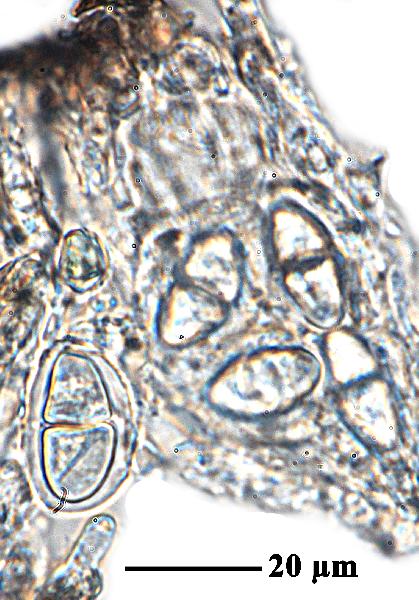

Felix Schumm - CC BY-SA 4.0
[10543], Österreich, Steiermark, Niedere Tauern, Donnersbacher Alpen,
Morsbachhütte, Glimmerschieferblock, ca. 1300 m. Leg. et det.
Erich Putzler, 11.08.1954.
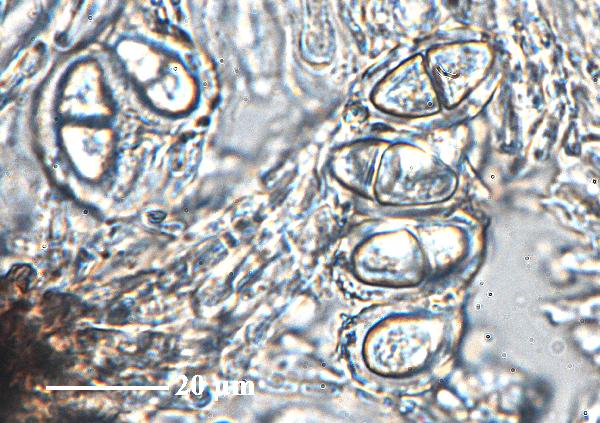

Felix Schumm - CC BY-SA 4.0
[10543], Österreich, Steiermark, Niedere Tauern, Donnersbacher Alpen,
Morsbachhütte, Glimmerschieferblock, ca. 1300 m. Leg. et det.
Erich Putzler, 11.08.1954.
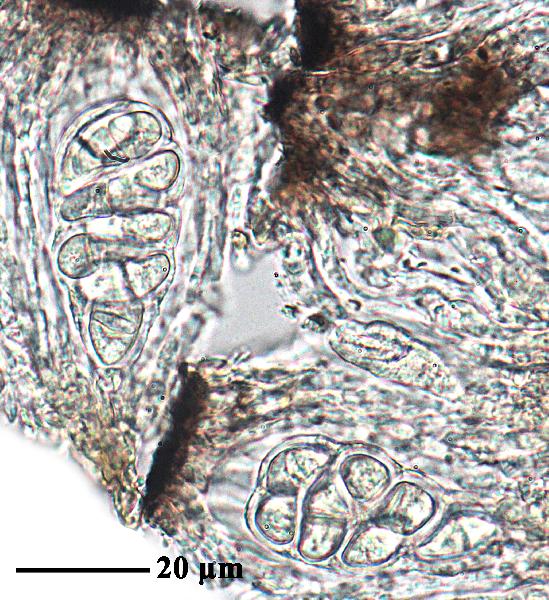

Felix Schumm - CC BY-SA 4.0
[10543], Österreich, Steiermark, Niedere Tauern, Donnersbacher Alpen,
Morsbachhütte, Glimmerschieferblock, ca. 1300 m. Leg. et det.
Erich Putzler, 11.08.1954.
Growth form: Crustose
Substrata: rocks
Photobiont: green algae other than Trentepohlia
Reproductive strategy: mainly sexual

Predictive model


Felix Schumm - CC BY-SA 4.0
[10543], Österreich, Steiermark, Niedere Tauern, Donnersbacher Alpen, Morsbachhütte, Glimmerschieferblock, ca. 1300 m. Leg. et det. Erich Putzler, 11.08.1954.


Felix Schumm - CC BY-SA 4.0
[10543], Österreich, Steiermark, Niedere Tauern, Donnersbacher Alpen, Morsbachhütte, Glimmerschieferblock, ca. 1300 m. Leg. et det. Erich Putzler, 11.08.1954.


Felix Schumm - CC BY-SA 4.0
[10543], Österreich, Steiermark, Niedere Tauern, Donnersbacher Alpen, Morsbachhütte, Glimmerschieferblock, ca. 1300 m. Leg. et det. Erich Putzler, 11.08.1954.


Felix Schumm - CC BY-SA 4.0
[10543], Österreich, Steiermark, Niedere Tauern, Donnersbacher Alpen, Morsbachhütte, Glimmerschieferblock, ca. 1300 m. Leg. et det. Erich Putzler, 11.08.1954.


